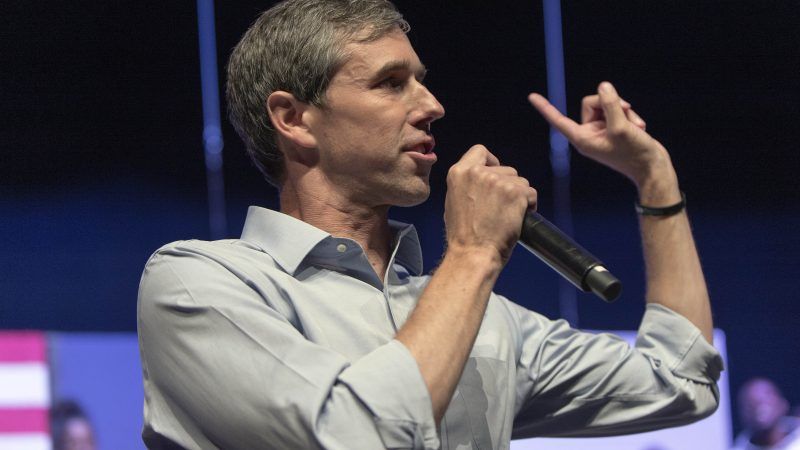If Confiscating 'Assault Weapons' Is a Gimmick, So Is Banning Them
Beto O’Rourke’s scheme would be an ineffectual attempt to enforce arbitrary distinctions.

Beto O'Rourke is taking flak from other Democratic presidential contenders for supporting mass confiscation of military-style rifles, a proposal several of them view as an impractical campaign gimmick. Although they are right about that, all the Democratic candidates are guilty of magical thinking on this issue, because they support an "assault weapon" ban that cannot reasonably be expected to have a measurable impact on gun violence.
"Hell, yes, we're going to take your AR-15," O'Rourke declared during last month's Democratic presidential debate. The former Texas congressman, whose campaign immediately started selling T-shirts emblazoned with that threat, clearly thinks it will appeal to Democratic primary voters.
But O'Rourke has not given much thought to how he would translate his slogan into reality. During last week's Democratic debate, CNN's Anderson Cooper asked O'Rourke how he would confiscate 16 million or so guns, since "you don't even know who has those weapons."
O'Rourke's response: "I expect my fellow Americans to follow the law." He repeated that line the next day, when CNN's Alisyn Camerota pressed him to explain how he would "get assault weapons away from people who don't want to give them up."
Camerota was incredulous. "You expect mass shooters to follow the law?" she asked. "Our fellow Americans will follow the law," he insisted. "Yes."
The experience of states that have mandated registration of "assault weapons" suggests otherwise. A year after New Jersey banned the possession of unregistered "assault weapons," a grand total of 18 had been surrendered or confiscated, out of an estimated 100,000 to 300,000 guns covered by the law.
California, New York, and Connecticut met with similar success when they required registration of "assault weapons" owned before those states banned them: Only a small minority of the targeted guns, ranging from 2 percent to 15 percent, were actually registered. Since O'Rourke wants to confiscate "assault weapons," and not merely register them, he can expect even wider defiance.
While Camerota was appropriately skeptical of O'Rourke's mandatory buyback plan, she nodded in agreement as he described the guns he wants to seize as "materially different" from handguns and hunting rifles because they fire at "a terrifying rate." O'Rourke also thinks so-called assault weapons are uniquely suitable for mass shootings because they fire "high-impact, high-velocity round[s]."
Neither of those claims is true. The characteristics that distinguish "assault weapons" from other guns—features like pistol grips, threaded barrels, barrel shrouds, and folding or adjustable stocks—have nothing to do with rate of fire, caliber, ammunition capacity, or muzzle velocity.
If you remove those prohibited features, you are left with a gun that is equally capable of quickly killing lots of people. Even former Vice President Joe Biden, who joins the other Democratic candidates in supporting a new federal law prohibiting the manufacture and sale of "assault weapons," concedes that the 1994 ban, which expired in 2004, had no impact on the lethal capacity of legal firearms.
Biden notes that gun manufacturers could comply with that law by "making minor modifications to their products—modifications that leave them just as deadly." That is equally true of the new, supposedly improved "assault weapon" ban proposed by Sen. Dianne Feinstein (D–Calif.), who also wrote the 1994 law.
Nor do "assault weapons" figure prominently in gun violence. In 2017, according to the FBI, all rifles combined—only a subset of which would qualify as "assault weapons"—accounted for just 5 percent of guns used in homicides where the type of firearm was specified, while handguns accounted for 89 percent. Even mass shooters prefer handguns.
The Democratic presidential candidates, including the ones who criticize O'Rourke's confiscation scheme as impractical, nevertheless insist that banning this arbitrary category of firearms "would be huge," as South Bend, Indiana, Mayor Pete Buttigieg put it last week. That belief is no less a fantasy than O'Rourke's dream that Americans, including would-be mass shooters, will happily turn in the guns he thinks they should not have.
© Copyright 2019 by Creators Syndicate Inc.


Show Comments (90)